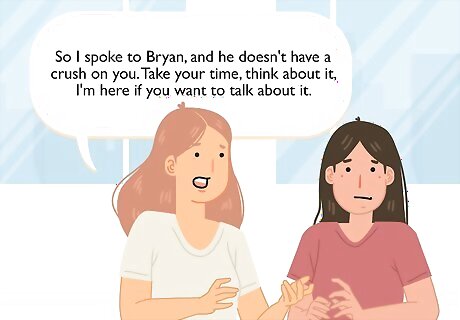
views
Tailoring Your Message to Your Friend

Be blunt with purposeful, determined friends. For this kind of friend, don't bother trying to dress up the bad news. Don't use clichés and don't try to make them see the bright side. Just give it to them straight. The way you deliver your message has to be tailored to the type of friend you're dealing with. This will make the message more effective, and makes it easier for your friend to accept the truth. An example of a message tailored to this kind of friend: “I spoke to Lisa yesterday, and she told me she doesn't like you the way you like her. Sorry.”

Focus on the positive with creative friends. These friends are usually the loudest, and you'll often find them planning social outings; they're the passionate and outgoing type. With them, you need to work on the content and delivery of your message. Help them see the silver lining in the situation by focusing on helping them move on. For these friends, an example delivery would look like: “So I talked to Greg. He doesn't see you that way but you're worth it, and you deserve someone who'll think so. Now let's do something to make you feel better!”

Be patient with your more gentle, caring friends. People with this kind of personality don't have the best reaction to bad news; they tend to get a bit stubborn and drag their heels. Bad news like this needs a bit of reinforcement to sink it for this kind of person, but you need to make sure you provide a lot of reassurance over time. With these friends, say something like: “Mary told me she doesn't have a crush. It's going to hurt for a bit, but you can get through this. Keep your chin up.” Remember—good friends structure their feedback in a helpful way that isn't hurtful to others.

Give the analysts time and space. For your brainier friend who's used to thinking everything through, be prepared for a lengthier process. After you give them the bad news, they'll need some time to process things before they start asking questions or really needing your help. Take this time to prepare for their questions and be ready to support them. Introducing these news to this kind of friend will sound something like: “So I spoke to Bryan, and he doesn't have a crush on you. Take your time, think about it, I'm here if you want to talk about it.”
Helping Them Process the News

Respect your friend's feelings. Remember that rejection is difficult. Your friend might lash out or retreat inwards and blame themselves for the situation. No matter their reaction, you need to make sure you're respectful and treat them with dignity. Telling your friend to “man up” or to “stop being a baby” is a sure fire way of making them feel worse about the whole situation. If your friend lashes out and starts insulting their crush, tell them that while you understand how they feel, they should avoid using insults. Remind them that it's not helpful or kind to lob insults, even when you're in pain.

Don't take anything they say personally. Your friend, in their pain and frustration, might react by taking it out on you. Don't take this to heart: you're not to blame. Rejection is hard, and your friend might be lashing out at the first target they see to vent their frustrations. While helping your friend through their feelings, you can remind them that they shouldn't attack you. If your friend asks why you told them, explain to that it's for their own good; you didn't want to see them pursue someone who's not interested in them.

Help your friend think of the future. Don't think your job is done once you've told your friend the truth about their crush. After delivering the hard truth, make sure you stick around to support your friend. Help by thinking of solutions. If you can think of a better match for your friend, try to get your friend thinking about them instead. If your friend has a big project coming up soon, try to help them focus on that.

Reinforce their self-worth. It's important to help your friend remember that they're still someone worthy of love. The important thing is to help them save face; just because this crush doesn't like them doesn't mean no one else will. Use compliments! Reinforce your friend's qualities by saying them out loud. Remind them that these things make them a great catch, and that someone will see that too.
Learning (and Not Hiding) the Truth

Talk to your friend's crush. You need to start by confirming that they don't like your friend. Try to be subtle when asking your friend's crush what their feelings are. Revealing your friend's identity could cause some serious embarrassment. Casually ask this crush who they're interested in. You can try listing names and asking whether the people listed appeal to the crush or not. If your friend's crush tells you they don't like your friend, take a hint. Don't try to change their mind, and be civil as you leave the conversation.

Decide if telling your friend is the right thing to do. Ask yourself why you wanted to know this information, and why you want to tell your friend. If your friend asked you to find out, then you can let them know the answer without worrying. If you went and sought this information on your own, check your motivations. If you heard your friend's crush making fun of them, or if you know for a fact they're interested in someone else, you're doing the right thing in telling your friend.

Don't psyche yourself out. The more you tell yourself how difficult this conversation is going to be, the more difficult it will become. You'll get nervous about telling your friend the news, and you might put it off indefinitely. Worse, you might tell them when you're completely unprepared. Stay relaxed, and try to handle the situation calmly. Remind yourself that you're doing this for the right reasons. You want to save your friend the embarrassment and pain of pursuing someone who won't return their affection.

Come out and tell your friend. The worst thing you can do after finding out your friend's crush doesn't like them is to sit on the information. You might feel the temptation to hold off on telling them, hoping that their crush will come around, but all you're really doing is delaying the inevitable. After you've spent some time thinking about how best to break the news to your friend, you need to get over your apprehension and actually tell them.



















Comments
0 comment